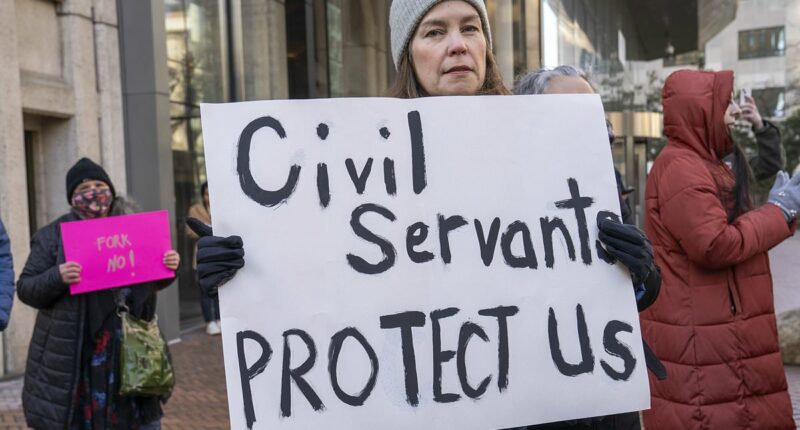Share this @internewscast.com
Federal employees have been left feeling ‘terrified’ and ‘disoriented’ as a potential government shutdown approaches.
Congress is currently at an impasse regarding federal funding, and if no resolution is achieved by October 1, the beginning of the new fiscal year, the government will undergo a complete shutdown.
Democrats are pushing for the extension of health insurance subsidies to keep expenses low, the reversal of Medicaid cuts imposed by Trump’s legislative reforms, and the restoration of public media funding previously slashed in a former budget deal.
However, the president has halted negotiations with Democratic leaders, labeling their demands as ‘unserious’ and asserting that discussions would not be fruitful.
The White House instead issued a memo on Wednesday, urging federal agencies to ‘use this opportunity’ to prepare for fast-tracked mass layoffs.
This situation leaves employees across the country uncertain about which programs might lose funding due to a mismanagement of priorities with Trump’s administration, and if they will be among those furloughed or compelled to work without pay.
‘I’m really scared of having to endure this ordeal again,’ a federal worker, recently let go and then rehired following budget cuts, shared with CNN.
‘This kind of treatment is inhumane,’ they added. ‘I don’t even know how to prepare for the complete unknown.’

The deadlock in Congress over federal funding persists, and without an agreement by October 1—the start of the new fiscal year—a full government shutdown looms on the horizon (pictured: The Capitol).

Democrats have demanded extending health insurance subsidies that help keep costs down, rolling back Medicaid cuts from Trump’s One Big Beautiful Bill Act, and restoring funding for public media that was cut in an earlier budget package

The looming shutdown has left federal employees across the US feeling ‘terrified’ and ‘disoriented,’ uncertain whether their jobs will survive the days ahead
Another anonymous employee, identifying as a ‘middle-class American and mother,’ said she feels ‘disregarded and abandoned’ by the latest shutdown threats – and uncertain how to prepare for the possibility of not receiving a paycheck.
‘I’ll go home today and take stock of my budget and pantry and make sure my family can ride out the next month or more, of whatever is coming,’ she told the outlet.
‘And then tomorrow, I’ll get up and come to work and do my best for America, until they tell me I can’t come to work anymore.’
Alex Berman, an IRS employee and leader of the National Treasury Employees Union, described a ‘constant state of fearful uncertainty,’ adding that this potential shutdown feels chillingly different from those in previous years.
‘The added complication is that this might be used as a pretext to tell people that they don’t have a job anymore – and that isn’t how the system is supposed to work,’ Berman told CNN.
‘Federal employees are largely middle class,’ he added. ‘We’re wondering if our families will have a Christmas this year.’
An employee at the Federal Aviation Administration (FAA) shared with the outlet how, with a growing family at home, they’ve already started cutting back on non-essential spending this summer in preparation for a possible shutdown this fall.
During the government’s record-breaking 35-day shutdown in December 2018 – which left nearly 800,000 employees without pay for weeks – the worker said they had to rely on their parents and local community just to get by.

The White House (pictured) issued a memo on Wednesday, urging federal agencies to ‘use this opportunity’ to prepare for fast-tracked mass layoffs

An FAA employee shared how, with a growing family at home, they’ve already started cutting back on non-essential spending this summer in preparation for a possible shutdown this fall (pictured: stock FAA workers)

A correctional officer (stock photo) at the high-security US Penitentiary Canaan said he’s considering a personal loan to cover car payments and rent, depending on the shutdown’s duration
‘This puts a huge strain on me and my family,’ they told CNN. ‘With a career that already is one of the most stressful jobs, lets just add a huge amount of stress on top of that.’
Dave Demas, a correctional officer at the high-security US Penitentiary Canaan in Pennsylvania, said he’s considering a personal loan to cover car payments and rent, depending on the shutdown’s duration.
He explained that he and his wife will do everything they can to prevent the shutdown from disrupting their two daughters’ afterschool activities.
‘We’re going to do our best to keep their lives running the same, but mine might change drastically,’ the father said.
A General Services Administration worker and military veteran of over 20 years admitted to actively searching for private-sector opportunities – seeking stability in the face of relentless uncertainty.
‘It’s very challenging to stay motivated and on this career path,’ the employee told the outlet. ‘It’s just too much mentally.’
At the Department of Education – an agency Trump has sought to shut down entirely – employees said that they feel ‘at a loss to understand or predict’ what the coming days will bring.
‘We are all being kept on our toes,’ an employee added.

At the Department of Education – an agency Trump has sought to shut down entirely – employees said that they feel ‘at a loss to understand or predict’ what the coming days will bring

On Thursday, Liz Shuler (pictured), president of the AFL-CIO, said government employees have ‘already suffered immensely’ this year under the Trump administration

An employee identifying as a ‘middle-class American and mother,’ said she feels ‘disregarded and abandoned’ by the latest shutdown threats – and uncertain how to prepare for the possibility of not receiving a paycheck
Bonita Williams, a contractor at State Department headquarters, said that although she kept her job during the last shutdown, ‘it was a struggle.’
‘My children work for the federal government, so if they are furloughed, I’m going to have to give my kids money. Last time around, some of my kids went to food banks,’ Williams, who typically doesn’t receive backpay as a contractor, told the outlet.
‘I can’t prepare,’ she added. ‘I’m living paycheck to paycheck.’
Right now, Republicans and Democrats are in a standoff over a short-term funding bill that would keep the government running while they negotiate a longer-term deal.
Last week, the Senate rejected competing stopgap proposals to avoid a shutdown, after the Republican-controlled House narrowly passed a bill that nearly all Democrats opposed.
Congressional Democrats are now under growing pressure to stand their ground and use their Senate votes to push for key demands, including healthcare protections and public funding.
But Republicans aren’t budging.
Senate majority leader John Thune told CNN that the Democrats’ requests – particularly around healthcare – were ‘completely unhinged, unreasonable, and unserious.’

House Minority Leader Hakeem Jeffries (pictured) reaffirmed the party’s resolve at the conference, declaring that Democrats ‘will not be intimidated’ by the president’s threats

If the government does shut down – either partially or fully – essential operations like Social Security, military duties, immigration enforcement and air traffic control will continue, though other services may be delayed or disrupted

Trump claimed a shutdown is exactly what the Democratic party wants, stating during a Thursday news conference, ‘They never change’
On Thursday, Liz Shuler, president of the AFL-CIO, said government employees have ‘already suffered immensely’ this year under the Trump administration, as reported by The Guardian.
She specifically called out the deep cuts to the federal workforce, stressing that employees ‘are not pawns for the president’s political games.’
While Democrats blame congressional Republicans for the looming shutdown, the Trump administration is pointing the finger back at them.
Trump claimed a shutdown is exactly what the Democratic party wants, stating during a Thursday news conference, ‘They never change’.
A senior official for the administration told the outlet: ‘It’s unfortunate Democrats have decided to instigate a government shutdown by opposing a clean government funding extension.’
‘Their unreasonable and insane demands, like healthcare for illegal aliens and funding for NPR, will be directly responsible for this outcome,’ they added.
House Minority Leader Hakeem Jeffries reaffirmed the party’s resolve at the conference, declaring that Democrats ‘will not be intimidated’ by the threats.
If the government does shut down – either partially or fully – essential operations like Social Security, military duties, immigration enforcement and air traffic control will continue, though other services may be delayed or disrupted.
Shutdowns can be broad and long-lasting, with past closures affecting national parks, museums, air travel, food safety inspections and immigration hearings.
And while the wider economy may seem untouched at first, experts warn that a prolonged shutdown could trigger a dangerous slowdown, shake markets to their core and ultimately shatter public trust in government.
















